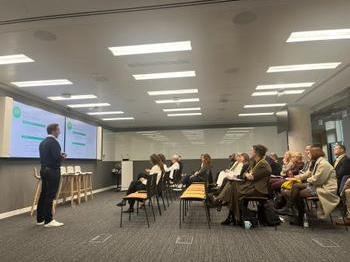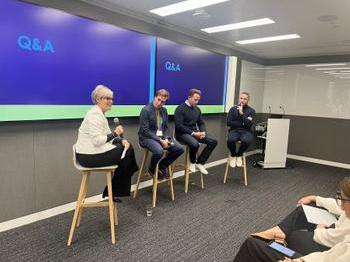Three Key Takeaways from the latest Leadership & Innovation meeting
On October 24th, 2023, industry leaders from the outsourcing and staffing sector attended our bi-annual Leadership & Innovation event hosted by LinkedIn at their London Headquarters.
Adam Hawkins, Head of Search & Staffing, LinkedIn, brought together the most impactful discussions from LinkedIn's Talent Connect 2023 conference in New York at the beginning of October addressing the unique challenges recruitment leaders face navigating the complex world of modern recruitment.
David Stott, VP at Bullhorn discussed the ways that organisations can prepare for winning new business in 2024 and how the focus of organisations has shifted in recent months. He shared top tips on how to focus your business development efforts using insights from top-performing clients and prospects and how you can automate your client engagement to deliver an incredible experience and lasting client relationships.
We closed the meeting with a panel discussion with both our speakers and Tom Davenport of Alvius, which resulted in a lively and insightful discussion with audience participation.
In this blog post, we will look at the three key takeaways from the meeting, that highlight how AI is reshaping the talent landscape and why reskilling is going to be paramount in the next decade.

1) AI's Transformative Role in the Talent Landscape
The first and most significant takeaway was the pivotal role of AI in shaping the future of the talent landscape. We have all heard the term Artificial Intelligence repeatedly in recent years, but the hype is real, and we are already seeing how it is impacting how we work, hire, and manage our careers.
As companies increasingly adopt AI-powered tools and technologies, the dynamics of hiring, employee management, and the nature of work itself are undergoing a profound shift. AI's influence on the talent landscape is multi-faceted, and it is imperative we understand how it's reshaping the employment landscape and what it means for the workforce of the future.
As AI becomes an integral part of our work environments, the skills required to thrive are evolving and recruiters will need to develop a more strategic set of soft skills.
2) Skills-First Hiring: The New Gold Standard
In the evolving talent landscape, skills-first hiring is emerging as the gold standard for recruitment. Traditional hiring processes often focus on credentials, experience, and qualifications, but a skills first approach is changing the game. Selecting a candidate on their skills, capabilities and potential has a significant impact on the size, diversity and access to talent.
This shift is driven by the idea that skills are a more accurate indicator of a candidate's potential for success in a role. AI-powered tools can analyse skills, such as coding proficiency, data analysis, or problem-solving, with greater objectivity and precision. As a result, recruiters are increasingly relying on data-driven insights to make hiring decisions.
However, this transformation also places new demands on recruiters. They now need to possess a more strategic set of soft skills to navigate this skills-first hiring landscape. This includes the ability to communicate effectively with candidates, assess cultural fit, and create a positive candidate experience. As the focus shifts to skills, recruiters are becoming strategic partners who help bridge the gap between an organisation's needs and a candidate's abilities, emphasising the importance of interpersonal and relationship-building skills in the recruitment process.
3) The Shift from Finding Talent to the Race for Clients
In the rapidly changing landscape, the focus is no longer solely on finding talent but also towards what can be described as "the race for clients." This transformation is a testament to the evolving dynamics of the workforce and the competitive nature of the staffing world.
As AI streamlines the recruitment process and helps identify the right candidates more efficiently, organisations are recognising that the real challenge lies in attracting and retaining clients, whether they are customers, business partners, or investors. Building and maintaining strong relationships with clients have become paramount, as these relationships are a significant driver of an organisation's growth and success. Nurturing client relationships goes beyond the initial transaction and extends to long-term engagement and satisfaction, ensuring repeat business and advocacy.
2024 and beyond is marked by the understanding that clients are not just transactions but valuable partners in a journey towards mutual success. Organisations will find themselves in a race to win and retain clients, making client-centric leadership and innovation the key to future success.

One thing is clear and that is that as we move forward, we must all embrace change, invest in learning, and foster an environment that welcomes innovation and diversity. We hope the event left attendees with a clear understanding of the challenges and opportunities that lie ahead in this AI-infused world of recruitment.
APSCo OutSource or UK members can download LinkedIn and Bullhorn slides from this event here.
